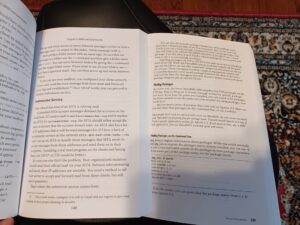(This post went to Patronizers at the beginning of December, and to the public at the beginning of January. Not a Patronizer? You could be.)
Autumn is my favorite Michigan season. Cool enough at night to wear sweatpants, warm enough in the day to wear shorts. Oh well, it’ll return. Some distant day.
Mostly shorter bits for you this month.
The immediate news is that despite the election, we’ll be staying in Detroit for now. We’re under less threat than many other people, and there are family issues with leaving. All I can say about this is that we’re preparing for trouble. On to happier things. Among them, long-term and short-term goals, business structure crap, and what I’m doing next.
I have a daft career. Tales that I dash off in a day go viral. Books that I spend a year writing and that fill obvious needs crumple like tinfoil submarines. The good news is, I’m far from the only creator this happens to. Well, my favorite mainstream rock band is Blue Öyster Cult. (Who? That’s as mainstream as I get, sorry.) If you know nothing else about the band, you’ve almost certainly seen SNL’s Cowbell Sketch about recording their biggest hit. That sketch went viral. Decades after the sketch, guitarist Buck Dharma was interviewed about surviving that sketch, and how to have a fifty year career. If you make stuff, and intend to make stuff over the long term, it’s worth reading.
Also, be careful when you pick your nom de plume. You might be stuck with it in your 70s, so be sure it’s cool as hell.
Next up: taxes. I’ve been struggling with my business structure for a while now, and the RYOMS kickstarter has shifted reorganizing from “an item on the to-do pile” to “set it on fire and shove it up my nose until I fix it.” The trick is finding an accountant who can handle intellectual property. That’s a highly specialized field, even among tax attorneys; your local CPA ain’t it. I have a bias towards using local people as much as possible, so I’ve been hunting in Detroit and then through greater Michigan. I had a call today with a top tax attorney, who told me I wouldn’t find the person I’m looking for in Michigan. I’m now querying my out-of-state writer friends, many of whom have IP tax attorneys. I get access to the same tax rules as other IP creation companies, so I need an actual, legitimate Hollywood accountant. Dog save me.
Finding that person is a right pain, though. I’m pretty sure I could hire Ernst & Young or one of those companies, but I’d rather have someone a little smaller and with a brain that’s a little more twisted. Fortunately, a friend JUST sent me a couple firms that presented at Author Nation so I have a small amount of hope.
Finally, the bit that’s probably of more interest to folks:
My experience over publishing the last few books, especially RYOMS, tells me a few things.
- People will sponsor tightly focused tech books.
- People will back such books on Kickstarter.
- If an ebook is not available on Amazon, people will come to my store or Gumroad instead–especially if you explain why.
Self-publishing and print-on-demand technology has improved over the last few years. I can now produce a reasonably robust ebook. Current POD binding techniques let us reasonably publish 600-page 7″x10″ books. I’m wondering if it’s time I self-publish a big tech book. Ideally I’d get the Absolute OpenBSD rights back from No Starch Press and do a third edition. (While I own the copyright on my NSP titles, that copyright is exclusively licensed to them.) If not that, a title like “Transcendent OpenBSD” would suffice. (NOT SAYING I’M DOING THIS BOOK, RIGHTS ARE COMPLICATED, THIS IS HYPOTHETICAL.)
There’s some risks in this, even beyond the time I’d spend writing the book. My back-of-the-envelope math 600-page print-on-demand book would retail for about $100, the ebook version about $40-$50. That’s steep. I know many tech books cost that much, but still. I’ve never even imagined charging that much for a self-pub title. The sponsorship and Kickstarter prices would increase. Basically, with that many words everything doubles or triples. Daydreaming about these kinds of numbers feels deranged.
Holding the price down that far assumes I make some fierce changes to the production process. I’d outsource indexing. A larger book would require several rounds of print proofs. The print Mastery books use a larger font. Squeezing an Absolute book into 600 pages doesn’t allow that; it’s basically “cram half a million words into this form factor no matter what it takes.” The result looked fine half a lifetime ago, but so did many other things. Here’s a page of RYOMS versus a page of AO2e. NSP’s print size is comparable to that used by other big tech book publishers, so I’m confident that they have achieved Minimum Viable Font.

Smaller print makes a huge difference, both in how many words you can cram in and legibility. This is clearly an Old People Problem.
On a related note, I have to do my production work on a commercial operating system. Microsoft is deprecating Windows 10 and my 9-year-old desktop can’t be upgraded to Windows Bloody Vomit11, so I bought a new workstation. I’m not saying I bought something with 128GB RAM because of this project, but Adobe has long considered my hardware a suitable replacement for their programming chops.
This whole concept is built on sand, though.
If I said, “Hey sponsors, I’m doing a giant book but ebook/print sponsorships will run $75 and $200,” would they nope out?
If the print book retailed for $100, would people buy it?
If I reclaim the rights for Absolute OpenBSD, the third edition would have a different production style than the first two editions. Would that alienate returning readers? Should I emulate the earlier edition’s cover art or use a Mastery-style cover?
Every book needs copyediting. Making changes after publication would be extra expensive, so I would need two copyeditors. Both would cover the entire book.
So, yeah. It’s tempting. A Kickstarter might break $100K, but have commensurate expenses. No reward without risk, no debacle without daftness.
But it’s getting late. I should put down the spreadsheets, put on Extraterrestrial Live, and be glad that SNL has never noticed me.

